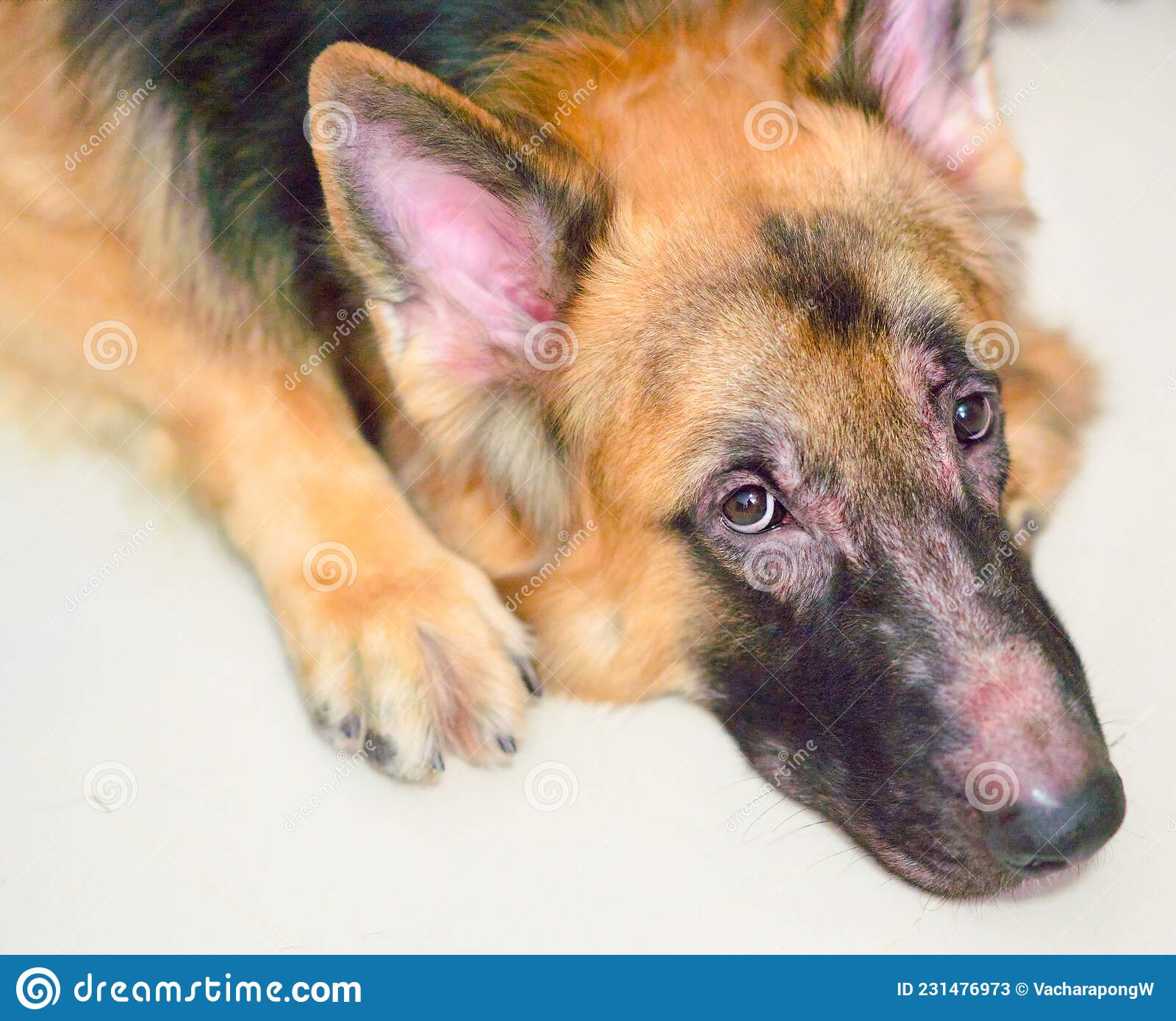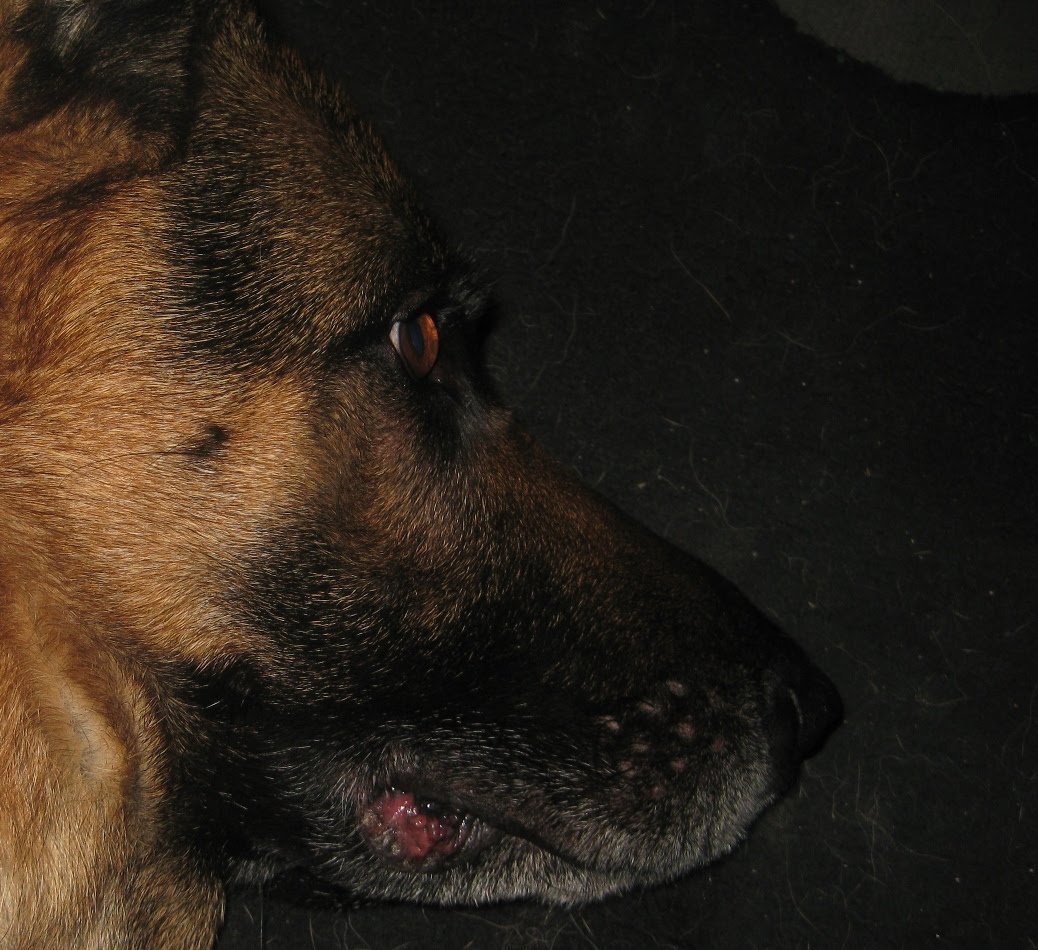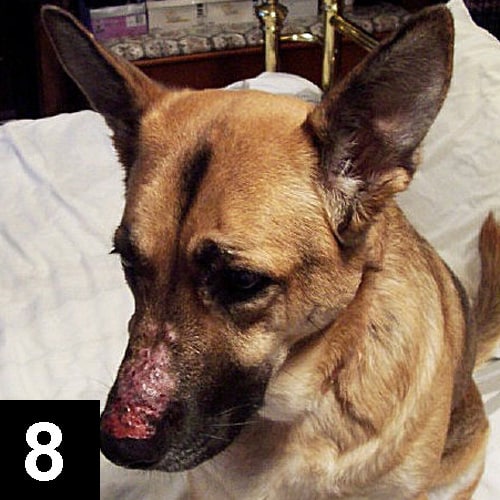German Shepherd Itching Constantly
None of us want to see our German Shepherd itching like crazy and constantly in discomfort.
Or, worsein pain from their own skin!
But there are solutions for German Shepherd allergies and dry skin that you can use right now to help your dog from itching like crazy.
Ill show you the exact things I do to help keep my German Shepherd from scratching and itching her dry skin that gives her quick relief. And you can do them right now, too!
Also Check: How To Get My German Shepherd To Stop Shedding
What Is Flaky Skin
It is perfectly normal for your dog to shed dead skin cells, and usually your dog will groom these dead cells away before you even have a chance to notice them. However, sometimes something causes the skin to shed in larger quantities than normal, resulting in dry flaky skin patches on your dogs coat which indicate there is a problem.
Read Also: How To Care For A German Shepherd Puppy
Congenital And Inherited Skin Tumors
Dogs are rarely born with skin tumors. Some lines of German Shepherds can develop nodular dermatofibrosis, which results in multiple pigmented masses on the skin . Growths that form on the feet can develop sores or cause foot deformities or limping. The growths develop during adulthood and indicate the presence of other types of tumors in internal organs, such as the kidneys or uterus.
Recommended Reading: Royal Canin Wet Dog Food German Shepherd
Causes And Treatments For German Shepherd Skin Problems
German Shepherds are a popular breed. And for good reason! They are characterized by not only their smarts, loyalty and courage, but also the thick fur coat that protects them. However, their coat makes them very susceptible to developing skin issues.
If you are a parent of a German Shepherd, stay informed by being knowledgeable about why they get skin allergies and what you can do for them.
Whether its paarsites like fleas, their food or other environmental irritants, there are steps you can take to help your shepherd live a more comfortable life and isnt that what its all about!?
Top 10 Common German Shepherd Health Problems

All pets are bound to have health issues the older they get at some point in their lives. Many variables come into play with the type and severity of the problem.
German Shepherds are no exception to the rule. However, there are preventive measures you can take to avoid some conditions potentially or, at the least, catch the condition before it can progress.
Joint issues are a concern for German Shepherd health, but there are several other diseases and conditions that owners need to be aware of.
Read Also: Fort Worth German Shepherd Rescue
Is Chicken Bad For German Shepherds
Your German Shepherd can eat chicken. This high-protein food provides your dog with lots of energy. Make sure the chicken is plain and avoid the skin as this is high in fat. Don t feed raw chicken due to the risk of salmonella unless your dog is used to a raw diet and you buy specially prepared raw food for him.
How Is Yeast Dermatitis Treated
Treatment for yeast dermatitis may be topical, oral, or a combination of both, and is based on the severity of your dog’s condition.
Topical treatment. Treatment with medicated shampoos is a vital part of treating yeast dermatitis. Many dogs with greasy or oily skin will require an initial degreasing cleansing with a shampoo containing selenium sulfide or benzoyl peroxide. After the initial bathing is complete, bathing with an anti-fungal shampoo containing chlorhexidine, miconazole, or ketoconazole is performed. It is important the anti-fungal shampoo remain in contact with the skin for at least ten minutes. To be effective, this topical treatment is required every 3-5 days for two to twelve weeks. If the infection is in the ears or in only one or two spots on the skin, a topical ointment may be prescribed for daily use.
Oral treatment. In more severe, chronic, or persistent cases of yeast dermatitis, the use of oral or systemic anti-fungal medications is often required. Many dogs with yeast dermatitis will also have a bacterial skin infection and will require antibiotics to treat the bacterial infection for typically four to twelve weeks. Oral anti-fungal medications include ketoconazole, itraconazole, and fluconazole.
Don’t Miss: Is It Good To Have Two German Shepherds
Hereditary Nasal Parakeratosis Of The Labrador Retriever
Hereditary Nasal Parakeratosis of the Labrador Retrieveris an autosomal recessive trait resulting in a keratinization defect of the nasal planum. It affects Labrador retrievers. Onset is noted at 6-12 months of age. There is dorsal nasal planum hyperkeratosis that is gray-brown in color. Diagnosis is made based upon signalment, history, and dermatohistopathology. Histology reveals parakeratotic hyperkeratosis with intercellular fluid . I treat as for nasal hyperkeratosis of older dogs, and most often use Dermoscent Biobalm® twice daily to effect and maintain use a few times per week.
Hereditary Nasal Parakeratosis of the Labrador retriever
Multisystem Disorders That Affect The Skin
Familialdermatomyositis is an inflammatory disease of the skin and muscles of young Collies and Shetland Sheepdogs. Problems with blood vessels of the skin and muscles occur in the early inflammatory stages of the disease, leading to decreases in size or wasting of those tissues. The onset is typically at younger than 6 months of age. The disease is variable, and individual pups within a litter may be affected differently. Ulcers, crusting, and hair loss appear on the face, ear tips, tail tip, and legs. Heat, sun exposure, and wounds worsen the condition. The muscles most affected are on the head and legs. Diagnosis is established by evaluation of littermates and family history, skin biopsy, electromyography, and muscle biopsy, which must be performed early in the course of the disease. Steroids, pentoxifylline, vitamin E, and omega-3 fatty acids may help. Severely affected dogs rarely respond well to treatment.
Also Check: Why Does My German Shepherd Puppy Bite
Other Treatment Options For German Shepherds
Most environment-related allergies are treated with over the counter treatments. Buying hypoallergenic or sulfate-free shampoo would be best for your German Shepherd. You can also choose a shampoo with either aloe vera or tree tea oil as the ingredients. These will provide a calming and soothing effect on their skin. Coconut oil can also soothe your dogs dry and itchy skin. Its a good option for moisturizing their skin.
Consult your veterinarian for antihistamine prescriptions for your dog. You may also visit a nutritionist so they could devise a good diet plan for your canine. Learn about our healthy protein food excellent for your German Shepherd.
What Are The Complications Of Allergic Dermatitis In Dogs
Allergic dermatitis is not a fatal disease, but it can be quite uncomfortable for your pet and lead to other health problems if left untreated. Untreated allergic reactions may cause secondary bacterial infections that require antibiotics to treat. Dogs that suffer from allergic dermatitis will also have a higher frequency of skin infections, ear infections, hot spots, or hair loss.
Recommended Reading: How Many Cups Of Food For German Shepherd
Walking When The Pollen Count Is Low
If your dogs skin allergies seem seasonal, it may be due to increased pollen. Spring is usually when pollen is at its worst. Generally, the pollen count seems to be lower in the morning. Also, checking the weather before going out can help you plan. Going outside cannot be totally avoided, but picking the best times can help.
Treatment Of Dermatitis In Dogs

There are various ways to treat dermatitis in dogs and care for your pet depending on the severity of their condition.
- Parasitic dermatitis: Regular use of a prescription flea, tick and mite treatment will eliminate the majority of these problems. Unfortunately, many fleas are now resistant to supermarket products so they cannot be relied upon to treat an infestation. 95% of the flea life cycle occurs off your pet, so a household treatment will also be required. Only certain prescription products will cover mites and ticks, so be guided by your vet as to which product your pet needs. Most of these require monthly treatment, although there are some which can last up to 3 months.
- Skin infections: An infection on the surface of the skin can be effectively controlled by the use of medicated shampoos. These require regular use initially to bring the infection under control. They can then often be reduced to once a fortnight to maintain the skin, dependent on your dogs condition. Some dogs with deeper skin infections may require prolonged courses of antibiotics to control the infection.
- Allergic dermatitis: The management of this is more complex and will likely be for the lifetime of your pet. They may become allergic to more things as they go through life. If your pet is allergic to dust mites or storage mites, reducing the numbers of these within your dogs accommodation may help. Storing food in sealed containers will reduce storage mites.
Don’t Miss: What To Know About German Shepherds
What Can I Give My German Shepherd For Itchy Skin
German Shepherd Itching Constantly?
- Feed a Hypoallergenic, Sensitive Diet.
- Bathe with a Medicated Shampoo.
- Apply a Moisturizing Skin Spray or Ointment.
- Develop a Regular Brushing Routine.
- Add Anti-Inflammatory Supplements to their Diet.
- Keep Them Clean, Especially During Allergy Season and Winter.
Develop A Regular Brushing Routine
Regular brushing distributes the oils on your dogs skin and helps to remove dead hairs that may cause itching.
Use soft strokes and a brush with rounded tips.
Specifically, try a rake brush that removes the dead undercoat. My GSD loves the rake brush, and this helps her to have the excess dead hair removed so that her skin can breathe more.
The rake brush I use has rounded tips so they dont irritate her sensitive skin or aggravate her itching. Plus, you want a double row brush to ensure youre getting the most hair off with the least amount of time and effort.
See the best brush to remove dander and itchy hair here: The Double Row Undercoat Rake
If you arent brushing your GSD, they can develop a thick blanket of hair that forms over their skin which prevents air from reaching the skin. This reduces the efficiency of the oil glands and causes your GSD to itch constantly and like crazy.
Learn a complete brushing routine that keeps your dog healthy and happy using this guide here: How to Brush a German Shepherd Like a Boss.
Don’t Miss: Best Bones For German Shepherds
German Shepherd Skin Allergies
German shepherds are susceptible to skin allergies due to their thick coats. They can develop skin allergies at any age in their lives, but they are more likely to do so from 1 to 5 years old.
Environmental factors like dust, mites, fleas, etc., play a major role in skin allergies of German shepherds. These allergies are triggered by allergens that are commonly present in the environment or food.
Genetic mutations are also a factor causing skin allergies. Canine atopic dermatitis is the most reported skin allergy among German shepherds. Some other skin allergies are also observed such as:
- Flea allergy dermatitis
- Contact dermatitis
What Is The Prognosis For Dogs With Allergic Dermatitis
Allergic dermatitis in dogs is a chronic condition that can severely affect both patients and clients, leading to poor quality of life and client satisfaction. Preventing flare-ups improves patient quality of life as well as minimizing adverse effects from prolonged administration of medication. Flare-ups can be prevented by identifying offending environmental allergens through the use of immunotherapy while desensitizing dogs with those allergens so they no longer cause an allergic response.
Allergic dermatitis in dogs is a common allergic skin condition that affects over 10% of dogs. There are many treatment options available to help keep your dog comfortable and free from inflammation and scratching, but you need to take notice if the symptoms persist or worsen. If left untreated, allergic dermatitis can lead to secondary bacterial infections and serious complications such as swelling of the face or body . While allergic dermatitis has no cure, there are plenty of treatment options available that will provide relief for your dog with allergies. If you have any questions or if you’re concerned that your dog may have allergic dermatitis, please consult with your veterinarian as they can help formulate an individual treatment plan for your dog.
Read Also: Do German Shepherd Puppies Have Curly Tails
German Shepherd Skin Issues And Treatment Options
The German Shepherd is a multifaceted dog with a loving nature and extremely loyal temperament. They are incredibly smart and easily trained for a multitude of various jobs and tasks. They partake in a wide range of important jobs including guiding the blind, drug detection, police and military work, search and rescue, therapy and more. German Shepherds make brilliant companions and excellent guard dogs due to their protective nature. They are traditionally known for their beautiful black and brown furry coats but unfortunately the breed is susceptible to a variety of skin allergies that can lead to irritating and often painful skin issues. It is very important to recognize German Shepherd skin issues to make sure that you can appropriately treat them.
This article will cover all of the possible German Shepherd skin issues that your dog can face including environmental, food-related and genetic allergies.
If Theres No Food Or Seasonal Allergy Are There External Parasites Present
Lets assume that you have completed the skin examination and youve found that all checks out no apparent abnormalities anywhere but your dog is still itchy. Now its time to check for external parasites .
To test for external parasites, simply get a flea comb and carefully run it through portions of your dogs fur. Its unlikely that you will comb out a live flea, as they are rather elusive, but if fleas are present you will almost certainly comb out an egg or two.
Flea eggs can also be difficult to see, so clean the comb out over a white piece of paper. The eggs are dark in color, so they will be easier to see on a white background.
If you do not come across any fleas or flea eggs, then there is a good chance that you will come across a louse. Louse, singular for lice, are about the size of a small sesame seed.
If you have determined that fleas or lice are present on your dog, the next step here is to wash all of your dogs bedding, as well as your sheets and anything other fabric that your dog may lie down on.
After you do this, its time to treat your dogs flea or lice problem directly. You will need to purchase a good quality flea shampoo to treat your dog effectively.
Regardless of whether your dog has fleas or lice, a flea shampoo will be effective to treat the issue. Most flea shampoos contain either pyrethrins or organophosphates, which are both effective at getting rid of both lice and fleas.
Read Also: Where To Buy German Shepherd Husky Mix
Recommended Reading: How Much To Feed 8 Month Old German Shepherd
Flea Dermatitis Or Flea Allergy In German Shepherd
Flea dermatitis is one of the most common skin problems in German shepherds and this becomes a flea allergy in this breed because shepherds are allergic to fleas and flea saliva.
When your pup is bitten it will develop symptoms of inflamed skin and itchy skin that it will constantly lick, bite, chew and rub. They can end up with open sores which can, in turn, lead to a secondary infection.
Prevention is the key to avoiding flea dermatitis by using flea products to repel fleas such as a collar, drops, or pills. Discuss this with your pups veterinarian first to make sure the products you choose are safe.
If you end up with a full-blown flea infestation, your whole house will need to be treated preferably by an exterminator. Your shepherd will need a flea bath to rid them of the fleas and dont forget to wash your pups bedding as fleas gather there. Eliminating all fleas is essential.
As well as skin problems, fleas can cause bacterial infections, anemia, and tapeworms.
Why Is My German Shepherd Scratching So Much Skin Issues That Plague Gsds

German Shepherds have a very thick fur coat that is designed to protect the dog from all kinds of potential perils.
But GSDs also have a tendency towards skin issues and skin allergies that can cause a lot of scratching and discomfort.
You know how much it bothers you to feel itchy and not be able to get it to stop.
It can be even more stressful to watch your dog constantly scratching and itching and itching and scratching and not know what to do to help your dog feel better.
In this article, we dig down deep to discover why German Shepherds might start scratching a lot, what the underlying root causes could be, and what to do to help your dog feel better.
Why Is My German Shepherd Scratching So Much?
German Shepherds as a dog breed are particularly prone to skin allergies and skin issues. This is the most common reason why a German Shepherd might start scratching a lot.
Where many new GSD owners get confused is how allergies affect a dog versus how allergies affect a person.
In dogs, allergies most often cause the dog to lick, bite at or scratch the skin, ears, tail area, or paws.
Allergies may be caused by bacteria, fungus, pests, parasites, food, environmental toxins, pollen many of the same triggers for allergies in people.
Read Also: How To Teach My German Shepherd To Attack On Command